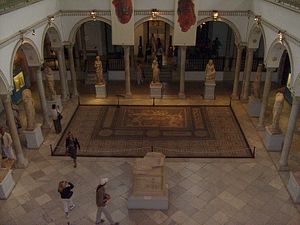On Wednesday, gunmen opened fire on tourists as they were disembarking from a bus in front of Tunisia’s Bardo National Museum. The gunmen then chased the visitors inside the museum, where the incident escalated into a hostage crisis until police eventually killed two gunmen. A manhunt is underway for two or three accomplices. There are conflicting accounts of total dead, with numbers ranging from 17 to 20 foreign tourists and a two or three Tunisians. However, the Japanese government has confirmed that three Japanese were killed and three others were injured. According to government sources, the three victims were Machiyo Narusawa (66), Chiemi Miyazaki (49), and Haruka Miyazaki (22).
Japanese Prime Minister Shinzo Abe responded to the Tunisia attack, telling reporters, “Whatever reasons there might be, terrorism is never tolerable. We strongly condemn [the attack]. We will make every effort in the fight against terrorism while deepening cooperation with the international community.”
The National Police Agency sent the Terrorism Response Team-Tactical Wing for Overseas (TRT-2) to Tunis on Thursday. TRT-2, a team of terrorism experts specializing in tackling overseas terrorism linked to Japanese nationals, will work with local security officials to gather information on the incident and the terror group involved.
Tunisia is fairly stable compared to other countries in the region, but has struggled with violent attacks by Islamic extremists who have pledged loyalty to both Al-Qaeda and the Islamic State. Islamic State has claimed responsibility for the attack in messages posted online, although authorities are still investigating any links between the gunmen and terrorist organizations. Wednesday’s attack comes as a blow to Tunisia’s economy, which has finally started recovering from the tumult caused by the 2011 uprising. As Tunisian Prime Minister Habib Essid said, “This is [a] cowardly act to undermine our economy and a vital sector [tourism] contributing to it.”
The attack will undoubtedly have reverberations for Japanese tourism to Tunisia. In 2010, 13,000 Japanese visited Tunisia, but that number fell to just 3,000 in 2011 due to the uprising in Tunisia. Last year, that number had climbed back up to 6,000. The Bardo National Museum, located inside the parliament compound in central Tunis, is a major tourist attraction fabled for its large collection of Roman mosaics.
After the Foreign Ministry issued a travel alert to Japanese tourists and residents in Tunisia, travel agencies are reconsidering tour plans to the country. One of the Japanese killed and one of the injured were visiting Tunisia as part of a cruise arranged by Tokyo-based travel agency Cruise Planet Co. The Foreign Ministry warned Japanese in Tunisia to not go outside unnecessarily, and avoid public facilities and potential terrorist targets as much as possible.
Following the January beheadings of two Japanese citizens by IS, the rising number of terrorist incidents abroad involving Japanese nationals is likely to increase pressure on the Japanese government to beef up its anti-terrorism capabilities and expand its global role in combating terrorism. While there is a general sense in Japan that the two Japanese who traveled to Syria did so at their own risk – and therefore those murders have had little impact on Japan’s politics – the dynamics are different this time, because the victims were visiting as tourists in what was considered a relatively safe country.
Japan’s current anti-terrorism strategy, the “Three-Pillar Foreign Policy” announced in February in response to the IS beheadings, focuses on (1) strengthening counter-terrorism measures, (2) enhancing diplomacy toward stability and prosperity in the Middle East, and (3) assistance in creating societies resilient to radicalization. This includes bolstering the anti-terrorism capabilities of countries in the Middle East and Africa, implementing and enhancing international frameworks, increasing assistance to promote economic growth, and expanding people-to-people exchanges.

































